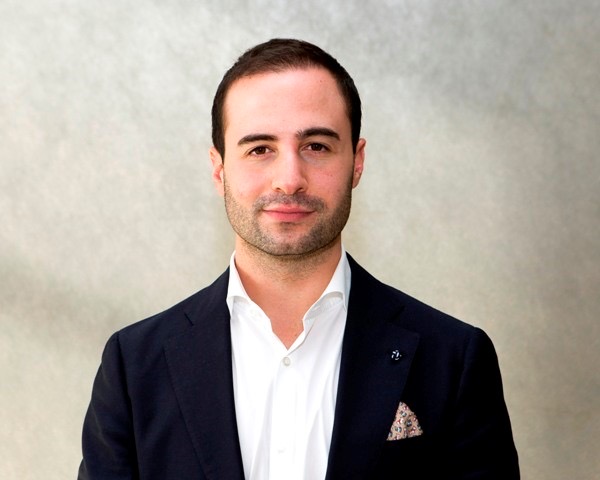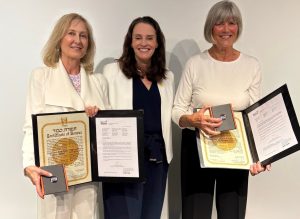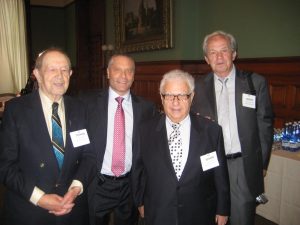This past week was Shael Rosenbaum’s first Yom ha-Shoah as new national chair of the Canadian Society for Yad Vashem (CSYV), and the Toronto real estate developer spent it attending two major Holocaust commemoration events.
A Yom ha-Shoah v’Gevurah ceremony was held April 17 at Toronto’s Holy Blossom Temple, and saw over 1,000 people mark the 80th anniversary of the Warsaw Ghetto Uprising in 1943. Earlier, Rosenbaum joined major donors at a preview of the soon-to-be opened Toronto Holocaust Museum, for which he was one of the founders and is immediate past chair.
Rosenbaum took over at the helm of the CSYV in January from Fran Sonshine, who stepped back after 14 years as the face of the Canadian education and commemoration arm of Israel’s Holocaust museum in Jerusalem.
“I think he’s going to be just great and he knows his way around what my husband calls ‘this Holocaust business’, ” Sonshine told The CJN, in a recent joint interview.

Third generation
While Sonshine, 75, was born to Holocaust survivor parents in a British internment camp in Cyprus, Rosenbaum, 36, is considered part of the 3G or third generation of survivors. His four grandparents were Holocaust survivors. Like Sonshine, the younger leader has made the Holocaust the major focus of his lifelong community and philanthropic work.
He feels it is his duty and responsibility.
“You know, when my friends were going to Ibiza and partying, I don’t know why my interest or my passion, morbid in a way, was to go back to Europe and find out and discover things about my family,” Rosenbaum said, recalling a long-ago trip to Dachau concentration camp in Germany where his paternal grandfather Sam had been a tailor for SS guards.
Before taking on his new role as CSYV chair, Rosenbaum, the scion of the founder of the Great Gulf Homes real estate development giant, was associate producer of the 2018 Canadian award-winning documentary The Accountant of Auschwitz. It covers the war crimes trial against a former German SS bookkeeper Oskar Groening.
Rosenbaum previously chaired the young adult division of the March of the Living, which takes adults under 40 to Poland for a three-kilometre march of remembrance at the Auschwitz death camp every year on Yom ha-Shoah.
He’s also done volunteer work for the Shoah Foundation, based in California, which houses a collection of tens of thousands of survivor testimonies originally recorded under the auspices of American filmmaker Steven Spielberg.
“A lot of the 2Gs are in their retirement phase with regards to their work with Holocaust survivors, not just because they created such a footprint in the work being done, but they’ve also lived with it their whole lives, with their parents,” said Rosenbaum, who was born the same year as the Canadian branch of CSYV was founded, in 1986. “So, it’s our turn now to basically carry on this legacy.”
Rosenbaum inherits an organization based in Toronto that sticks to fundraising, remembrance and education. It leaves the crowded space in Holocaust-centred work to other groups to focus more on advocacy work fighting antisemitism, he said.
The CSYV’s ongoing programs include: an annual fall tribute ceremony held at Queen’s Park, the Ontario legislature, to honour a select group of survivors, (it continued as a virtual event during the pandemic); a twinning program for b’nai mitzvah students who select the name of a child murdered in the Holocaust; a series of portable educational displays used across the country; ceremonies that honouring Righteous among the nations who saved Jews during the Holocaust; summer Holocaust training programs for educators at Yad Vashem in Jerusalem; and the Ambassadors for Change cohort of students who travel to Ottawa to meet with survivors and hear their stories first hand.
Loss of survivors
That last prong of Holocaust education—meeting with survivors—is now in jeopardy with the reality of losing so many of Canada’s 40,000 survivors, including Rosenbaum’s paternal grandmother Helen, who was 12 when she was deported and survived four camps, working as a cook. She died in February 2021.
Without that first-hand opportunity for audiences to hear and see a survivor speak about their testimony, those in “the Holocaust business” have to find different avenues to get their messages across.
“It’s an issue for every Holocaust organization,” Sonshine acknowledged.
She thinks future programs will rely partly on the 55,000-plus existing videos of survivors that were filmed over the past three decades by the USC Shoah Foundation in California. The initiative was founded by Hollywood director Steven Spielberg after he finished filming the award-winning movie Schindler’s List in 1993.
More recently, that centre has been using special digital technology to capture the testimony of 25 survivors, including the late Max Eisen of Toronto, and Pinchas Gutter, also of Toronto, who survived a half dozen death camps. Their interviews were filmed in a way that will allow students and researchers to interact with the survivors’ digital holograms, in real time, long into the future.
But there is also still a role for analogue storytelling, Sonshine believes.
“I think you’re going to have to have the stories being told by the second and the third generations. They can tell their parents’ and their grandparents’ story,” she said.
Which is where Rosenbaum feels he comes in, as an example of the next generation taking up the mantle—although he is already looking to encouraging the great-grandchildren of survivors to get involved.
He thinks other groups such as March of the Living can benefit from Yad Vashem when there are no survivors left to accompany the annual trips. He envisions the agency accessing the Jerusalem centre’s vast repository of Holocaust resources. Indeed, one of his main goals since taking over at CSYV is to collaborate more with community agencies who do similar work. This is very much in keeping with the priorities set by Yad Vashem’s new world chair, Dani Dayan.
For example, Rosenbaum feels there is an important place for the written word in transmitting Holocaust education, pointing to the books and manuscripts preserved in the collection of Yad Vashem in Israel. He also praises Canada’s Azrieli Foundation for its efforts to publish Holocaust survivors’ memoirs annually—including for the first time in 2023, five audiobook versions read by the survivors themselves.
That initiative, he feels, is “at the forefront of writing different novels with the survivors and actually putting their stories into updated versions that really speak to the new generations.”
Still a role for Holocaust museums
On April 16, Rosenbaum and Sonshine attended a gala reception at the site of the soon-to-be-opened Toronto Holocaust Museum, located next door to the original premises of what used to be known as the Sarah and Chaim Neuberger Holocaust Education Centre. Rosenbaum is the immediate past chair and Sonshine is on the advisory board.
The $27.5 million facility in North York, which opens June 9, is being touted as one of the most important weapons which the Ontario Jewish community will have to combat rising antisemitism and Holocaust distortion.
Some critics, including American author Dara Horn and Canadian-born professor Ruth Wisse, argue that Holocaust museums have not been successful in fighting antisemitism. Horn’s book People Love Dead Jews acknowledges the postwar need to honour the experiences of the survivors who came to Canada after the Holocaust, but suggests museums are the wrong way to tackle the surge in online Jew hatred and in popular culture.
Rosenbaum says museums can still play an important role, by teaching the broader context for the industrial murder of six million Jews by the Nazis during the Second World War. Sonshine agrees.
“To understand the Holocaust, you also have to understand, as Shael says, the context of it and the history of it and what actually happened. We can’t just forget about it. Part of our being is to remember,” she said.
Building Holocaust memorials
During her tenure, Sonshine was instrumental in the expansion of the CSYV’s signature outdoor memorial: the striking Holocaust installation in Toronto’s Earl Bales Park.
First opened in 1991, the site now lists nearly 5,000 names of victims, survivors and Righteous persons who helped save Jews. One panel at the entrance is entitled The Ed and Fran Sonshine Children’s Wall.


Like Sonshine, her husband Ed is also a child of survivors. A lawyer and founder of the RIOCan Real Estate Investment Trust, Ed was born in a displaced persons camp near the site of the former Bergen Belsen concentration camp in Germany.
Their wall lists 365 names of Jewish children who were murdered by the Nazis—one for each day of the year. They were among the 1.5 million children who perished.
Sonshine feels this site is her greatest legacy at the CSYV.
“We made it so that the city and the community and the country can actually go there and we can be proud of it.”
National Holocaust Monument in Ottawa
She is also gratified with her work that helped establish Canada’s National Holocaust Monument near Parliament Hill in Ottawa. It was inaugurated in 2017, after six years in development and construction.
Sonshine remembers being asked by then-Conservative cabinet minister John Baird to join a collective of prominent Jewish Canadians in order to raise over $4 million privately, which the federal government would then match, plus donate the land near LeBreton Flats.
“We were the only country, the only western country, that did not have a Holocaust monument, and the time had come that we would have one and I was very happy to do it,” Sonshine said.
However, the monument, located just west of Parliament Hill, has not been without its troubles.
Right at its opening, it was discovered that a key descriptive plaque did not mention that Jews had been the main victims of the Nazis’ Final Solution.
“I think the government was in a hurry and they just didn’t do it properly, but it got corrected immediately and they were really good about it,” Sonshine said.
Other problems saw cracks develop in the cement. Also, planners decided not to install heaters, which means the monument cannot remain fully open during the winter, due to snow and ice on the walkways of the Daniel Libeskind-designed structure.
The site has also attracted notoriety for being vandalized and also for being used inappropriately over the years by skateboarders and even by fashion photographers, who either didn’t know or didn’t care to treat the monument as a place of mourning and reverence. There are no security guards or on-site guided tours. (A downloadable app with a digital interactive walk for the site is now being developed by the Centre for Holocaust Education and Scholarship in Ottawa and Liberation 75).
During the pandemic, Sonshine worried that the monument was not being used to its fullest capacity to hold events and ceremonies.
“We used to call it our orphan,” Sonshine said. However, since the fall of 2021, a local committee in Ottawa has now taken over programming.
“They’re doing an amazing job.”
National Yom ha-Shoah ceremony held in Ottawa
For years, from 2003 to 2019, the CSYV’s signature event used to be the national Canadian Yom ha-Shoah ceremony, usually held at the Canadian War Museum in Ottawa.
During the first two years of the pandemic, in 2020 and 2021, it was held online.
This past week, on April 18, it was held outside at the National Holocaust Monument for just the second year in a row. Prime Minister Justin Trudeau delivered a keynote speech. Other dignitaries spoke, including members of the Opposition, the Centre for Israel and Jewish Affairs, the Israeli and Polish Ambassadors to Canada, Ottawa Jewish federation head Andrea Freedman and Rabbi Idan Scher. High school students recited the names of young victims of the Warsaw Ghetto Uprising and survivors lit memorial candles.
Shael Rosenbaum was supposed to speak. At the last minute, however, he could not attend. The CSYV’s executive director, Jonathan Allen, travelled from Toronto to deliver Rosenbaum’s remarks.
Book of Names
However in January of this year, as one of Rosenbaum’s first duties as incoming CSYV chair, he flew to the United Nations in New York with Toronto survivor Joe Gottdenker, for the launch of Yad Vashem’s new Book of Names exhibit.
Measuring eight metres long and two metres high, the exhibit comprises 30 large books whose pages contain the names and other information on 4.8 million known Jewish victims of the Holocaust. There are blank pages left for the 1.2 million others still to be researched, although Yad Vashem officials admit these may never all be completely identified.
“People never had an opportunity to say Kaddish for any of these names and here we’re going to have an opportunity to actually know the person’s name, possibly know a little bit about who the person was, their background, and for the first time, in almost 80 years, talk about the person,” Rosenbaum said, adding that it will also help refute Holocaust deniers who contend only a few hundred Jews died.
The exhibit spent a month in New York, before being returned to Yad Vashem in Jerusalem, where it will be on permanent display starting this week. An earlier version of the book is part of the Yad Vashem exhibit in Auschwitz, Poland in one of the barracks of the former death camp. At the time, that first book had identified 4.2 million names. The new one contains 600,000 additions. Officials say there are plans to bring the exhibit to Canada in the future.
Lost aunt
Seeing the names upon names at the exhibit in New York was particularly poignant for Rosenbaum. Although the names of his great-grandparents and extended family members are listed in the book of names, his mother’s older sister is not. Malka Rosenbaum learned only when she was already a teenager in Toronto that her survivor parents had had a daughter before her, who didn’t survive the Holocaust.
Malka’s parents had been hidden by a Polish family and gave birth to the baby while in hiding. The girl, named Esther, was taken away and given to another Christian family for safekeeping, Rosenbaum explained, because his grandparents feared her crying would have alerted the Nazis to the presence of Jews. They also didn’t want to endanger their rescuer.
In 2017, a Canadian filmmaker documented the Rosenbaum family’s efforts to learn the true story of what had happened to Esther. They travelled to Poland with genealogists and researchers and located the family that took care of this baby.
It was determined the baby had died of typhus after a week, and had been buried in a Catholic cemetery, which the Rosenbaums visited.
“And for the first time, somebody could say Kaddish for my aunt,” he said.
While Holocaust remembrance takes up most of Rosenbaum’s spare time, he also volunteers with other charities, including the Canadian Friends of Tel Aviv University. On May 7, he and his father Harry, who was born in Germany after the war, are being honoured at a gala fundraising dinner in Toronto. Proceeds will go towards nanoscience research at the Tel Aviv institution.
Author

Ellin is a journalist and author who has worked for CTV News, CBC News, The Canadian Press and JazzFM. She authored the book Double Threat: Canadian Jews, the Military and WWII (2019) and contributed to Northern Lights: A Canadian Jewish History (2020). Currently a resident of Richmond Hill, Ont., she is a fan of Outlander, gardening, birdwatching and the Toronto Maple Leafs. Contact her at [email protected].
View all posts








